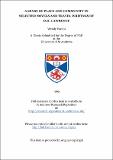Files in this item
A sense of place and community in selected novels and travel writings of D.H. Lawrence
Item metadata
| dc.contributor.advisor | Mallett, Philip | |
| dc.contributor.author | Vacani, Wendy | |
| dc.coverage.spatial | vii, 271 p. | en_US |
| dc.date.accessioned | 2018-07-10T08:34:02Z | |
| dc.date.available | 2018-07-10T08:34:02Z | |
| dc.date.issued | 1995-07 | |
| dc.identifier.uri | https://hdl.handle.net/10023/15154 | |
| dc.description.abstract | In 1919 Lawrence left England to search for a better society; his novels and travel sketches (the latter are usually seen as peripheral to the novels) continually questioned the values of Western society. This study examines D.H. Lawrence's great 'English' novels in the light of their vivid portrayal of place and community. However, to procure a new emphasis the novels and travel writing are brought into close alignment, in order to examine the way in which the sorts of philosophical questions Lawrence was interested in - ideas on human character, marriage, social structures, God, time, and history - influence his portrayal of place and community across both these genres. Chapter I, on Sons and Lovers, emphasises the way social and historical factors can shape human relationships as powerfully as personal psychology. In Chapter II, on Twilight in Italy, discussion of the effect of place on human character is broadened into a consideration of the differences between the Italian and English psyche; the philosophical passages are read in the light of revisions made to the periodical version. Chapters III and IV, on The Rainbow and Women in Love, conscious of the critique of English society that Lawrence made in Twilight, recognise that although Lawrence is concerned to show the flow of individual being he is no less interested in the relationship between the self and society, and the clash between psychological needs and social structures like work, marriage and industrialisation. Chapter V, on Sea and Sardinia, examines Lawrence's realisation that the state of travel engages with the present and impacts on individual needs and identity. Chapter VI, on Mornings in Mexico, studies the way Lawrence transcended the journalism usual to the travel genre and maintained a deep spirituality as he pondered the attributes of a primitive society and its appropriateness to Western Society. Because travel writing is both reactive and subjective (a writer's reaction to a country is underpinned by the metatext of his own concerns), I ask if Lawrence's presentation of experience can be thought of as accurate or whether places and people are constructs of his imagination. Chapter VIII examines Lady Chatterley's Lover as Lawrence's attempt to bring together the attitudes to sex, class and education witnessed on his travels with an English setting; to envisage a way of living that would meet the deep-rooted needs of man. Chapter VIII, on Etruscan Places, shows Lawrence conscious of encountering the ultimate journey, death, and pays tribute to the fact that while the book searches for philosophical answers on how to die, it is at the same time a paean to life and the beauty of landscape. | en_US |
| dc.language.iso | en | en_US |
| dc.publisher | University of St Andrews | |
| dc.subject.lcc | PR6023.A8Z5V2 | |
| dc.subject.lcsh | Lawrence, D. H. (David Herbert), 1885-1930--Travel | en |
| dc.subject.lcsh | Lawrence, D. H. (David Herbert), 1885-1930--Philosophy | en |
| dc.subject.lcsh | Lawrence, D. H. (David Herbert), 1885-1930--Criticism and interpretation | en |
| dc.title | A sense of place and community in selected novels and travel writings of D.H. Lawrence | en_US |
| dc.type | Thesis | en_US |
| dc.type.qualificationlevel | Doctoral | en_US |
| dc.type.qualificationname | PhD Doctor of Philosophy | en_US |
| dc.publisher.institution | The University of St Andrews | en_US |
This item appears in the following Collection(s)
Items in the St Andrews Research Repository are protected by copyright, with all rights reserved, unless otherwise indicated.

